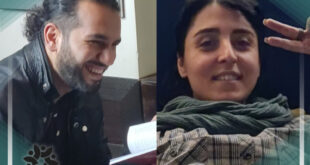According to Jamia Aryai news agency, Mohammad Ali Dadkhah, a lawyer and member of the Human Rights Defenders Association, who represented many civil activists and prisoners of conscience, including Yousef Naderkhani, the leader of the house church in Rasht, was arrested on July 29 and sent to Evin.
This lawyer has also represented the case of Dervish Gonabadi, Abdul Fattah Soltani, a member of the Human Rights Defenders Association and some political activists.
Iman Pirouzkhah, a lawyer, wrote on Instagram about this: After many years passed, he was sent to prison under illegal pretexts. “Dr. Mohammad Ali Dadkhah was sent to prison under illegal pretexts after years of serving his sentence related to the case of 2008.”
Mohammad Ali Dadkhah was sentenced to 9 years in prison by the 15th branch of the Revolutionary Court in July 2010, which was reduced to 8 years in the appeals court.
Mr. Dadkhah said in an interview in 2011 that he was told that the Center for Human Rights Defenders was seeking a “soft overthrow” in Iran and that it was an illegal organization.
It is necessary to mention that, on July 17, 2008, Mohammad Ali Dadkhah was arrested in his lawyer’s office by the security forces and was transferred to the detention center of one of the security agencies in Evin prison for questioning, and his office was also sealed.
According to reports, this lawyer has been on leave since 1392, and recently, the Tehran Prosecutor’s Office called him to serve prison terms with a claim against the legal and criminal law.
In recent months, the pressure on civil and political activists in Iran has intensified, and many of them have been arrested and sent to prison.
After intensifying the government’s pressure on the civil society, the courts issued heavy sentences against Christians, including two Armenian citizens, arrested some women on the pretext of “bad hijab” or “loose hijab”, and searched the houses of Baha’is and arrested some of them. have been arrested
Yusuf Naderkhani, the narrative of a resistance
Mr. Dadkhah, when Yusuf Naderkhani was accused of apostasy and the court issued his death sentence, he represented this convert.
Branch 11 of the Gilan Criminal and Appeal Court, headed by Judge Mohammadi Kashani, sentenced Yousef Naderkhani to death on the charge of “apostasy” at the end of September 2009.
Mohammad Ali Dadkhah said in Mehr of the same year that Yusuf Naderkhani was taken to the court to repent and return to Islam, but he refused to comply with this demand every time.
This sentence strongly protested human rights organizations, Christians and even political assemblies in the West. 14 other Muslim thinkers also defended him in a statement.

Under intense international pressure, in June 1391, the court acquitted Youssef Naderkhani of the charge of “apostasy” and sentenced him to three years in prison on the charge of “acting against national security”. Mr. Naderkhani, who had spent nearly three years in prison, was released.
There is no article in Iran’s Islamic Penal Code that considers this act as a crime. But there are several legal principles that give judges the authority to convict the accused of apostasy.
Hossein Soodmand, pastor of Mashhad Rabbani Congregation Church, was hanged for apostasy in 1369.
Mr. Naderkhani was arrested again, this time in 2015, along with his wife and three other converts, by security agents during a ceremony held in a private house in Rasht.
After being released on bail, Judge Ahmadzadeh, head of Branch 26 of the Islamic Revolution Court, on July 3, 2016, charged Yusuf Naderkhani and two Christian converts from the house church in Rasht, known as the “Church of Iran”, on charges of “establishing a house church” and “promoting The so-called “Christian Zionists” sentenced each of them to 10 years in prison.
Yousef Naderkhani has been sentenced to two years of exile to Nikshahr city in Sistan Baluchistan province in addition to being imprisoned.
After requesting a retrial, about two years ago, the Christian convert’s sentence was reduced to six years.
In April, the United States Commission on International Religious Freedom (USCIRF) issued a statement welcoming the granting of leave to Christian convert Youssef Naderkhani and demanding his full release.



